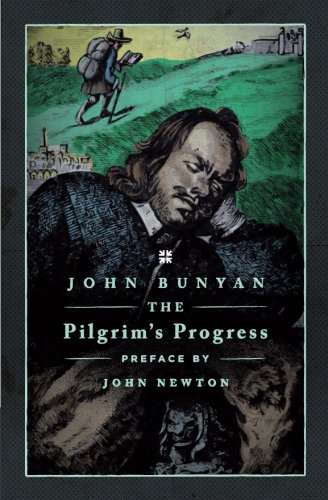-
The Pilgrim's Progress - Part II: By John Bunyan : Illustrated
John Bunyan
eBook (Digireads.com, Oct. 28, 2017)About The Pilgrim's Progress by John BunyanHow is this book unique?E-reader & tablet formatted, Font Adjustments100% Original contentUnabridged EditionAuthor Biography InsideIllustrations includedThe Pilgrim's Progress from This World to That Which Is to Come; Delivered under the Similitude of a Dream is a Christian allegory written by John Bunyan (1628–1688) and published in February, 1678. It is regarded as one of the most significant works of religious English literature, has been translated into more than 200 languages, and has never been out of print. Bunyan began his work while in the Bedfordshire county prison for violations of the Conventicle Act, which prohibited the holding of religious services outside the auspices of the established Church of England. Early Bunyan scholars like John Brown believed The Pilgrim's Progress was begun in Bunyan's second, shorter imprisonment for six months in 1675, but more recent scholars like Roger Sharrock believe that it was begun during Bunyan's initial, more lengthy imprisonment from 1660–72 right after he had written his spiritual autobiography, Grace Abounding to the Chief of Sinners.
-
Pilgrim's Progress
John Bunyan
eBook (Digireads.com, March 30, 2004)Begun while John Bunyan was in Bedfordshire county jail serving time for holding religious services outside the auspices of the Church of England, Pilgrim's Progress is considered one of the greatest works of the English language. "Pilgrim's Progress" is a Christian allegory that concerns the path of one's soul to Heaven. John Bunyan published the first part of the "Pilgrim's Progress" in 1678 with a second part to follow in 1679. Contained here in this volume is both the first and second part of "Pilgrim's Progress."
-
The Pilgrim's Progress : By John Bunyan - Illustrated
John Bunyan
eBook (Digireads.com, Dec. 17, 2016)How is this book unique?Unabridged (100% Original content)Formatted for e-readerFont adjustments & biography includedIllustratedAbout The Pilgrim's Progress by John Bunyan The Pilgrim's Progress from This World to That Which Is to Come; Delivered under the Similitude of a Dream is a Christian allegory written by John Bunyan (1628–1688) and published in February, 1678. It is regarded as one of the most significant works of religious English literature, has been translated into more than 200 languages, and has never been out of print. Bunyan began his work while in the Bedfordshire county prison for violations of the Conventicle Act, which prohibited the holding of religious services outside the auspices of the established Church of England. Early Bunyan scholars like John Brown believed The Pilgrim's Progress was begun in Bunyan's second, shorter imprisonment for six months in 1675, but more recent scholars like Roger Sharrock believe that it was begun during Bunyan's initial, more lengthy imprisonment from 1660–72 right after he had written his spiritual autobiography, Grace Abounding to the Chief of Sinners.
-
The Pilgrim's Progress: By John Bunyan : Illustrated
John Bunyan
eBook (Digireads.com, March 30, 2004)About The Pilgrim's Progress by John BunyanHow is this book unique?E-reader & tablet formatted, Font Adjustments100% Original contentUnabridged EditionAuthor Biography InsideIllustrations includedThe Pilgrim's Progress from This World to That Which Is to Come; Delivered under the Similitude of a Dream is a Christian allegory written by John Bunyan (1628–1688) and published in February, 1678. It is regarded as one of the most significant works of religious English literature, has been translated into more than 200 languages, and has never been out of print. Bunyan began his work while in the Bedfordshire county prison for violations of the Conventicle Act, which prohibited the holding of religious services outside the auspices of the established Church of England. Early Bunyan scholars like John Brown believed The Pilgrim's Progress was begun in Bunyan's second, shorter imprisonment for six months in 1675, but more recent scholars like Roger Sharrock believe that it was begun during Bunyan's initial, more lengthy imprisonment from 1660–72 right after he had written his spiritual autobiography, Grace Abounding to the Chief of Sinners.
-
The Pilgrim's Progress: By John Bunyan : Illustrated
John Bunyan
eBook (Digireads.com, Oct. 29, 2017)About The Pilgrim's Progress by John BunyanHow is this book unique?E-reader & tablet formatted, Font Adjustments100% Original contentUnabridged EditionAuthor Biography InsideIllustrations includedThe Pilgrim's Progress from This World to That Which Is to Come; Delivered under the Similitude of a Dream is a Christian allegory written by John Bunyan (1628–1688) and published in February, 1678. It is regarded as one of the most significant works of religious English literature, has been translated into more than 200 languages, and has never been out of print. Bunyan began his work while in the Bedfordshire county prison for violations of the Conventicle Act, which prohibited the holding of religious services outside the auspices of the established Church of England. Early Bunyan scholars like John Brown believed The Pilgrim's Progress was begun in Bunyan's second, shorter imprisonment for six months in 1675, but more recent scholars like Roger Sharrock believe that it was begun during Bunyan's initial, more lengthy imprisonment from 1660–72 right after he had written his spiritual autobiography, Grace Abounding to the Chief of Sinners.
-
Pilgrim's Progress
John Bunyan
eBook (Digireads.com, March 30, 2004)Begun while John Bunyan was in Bedfordshire county jail serving time for holding religious services outside the auspices of the Church of England, Pilgrim's Progress is considered one of the greatest works of the English language. "Pilgrim's Progress" is a Christian allegory that concerns the path of one's soul to Heaven. John Bunyan published the first part of the "Pilgrim's Progress" in 1678 with a second part to follow in 1679. Contained here in this volume is both the first and second part of "Pilgrim's Progress."
-
Pilgrim's Progress, The
John Bunyan
eBook (Dreamscape Media, June 5, 2018)The Pilgrim's Progress is a 1678 Christian allegory written by the Puritan preacher John Bunyan. Begun while Bunyan served a 12-year jail sentence for his nonconformist preaching, the novel unfolds over two parts, one concerning Christian, and the other his wife Christiana and their sons. Both concern the central characters’ ordeals in traveling from the worldly to the sublime, and are filled with allegorical characters with names like Hypocrisy and Prudence, and places like Plain Ease, and Doubting Castle. Considered one of the most significant works of religious English literature, it has been translated into more than 200 languages, and has never been out of print.
-
The Pilgrim's Progress
John Bunyan, Michael Russotto, Audio Book Contractors, Inc.
Audiobook (Audio Book Contractors, Inc., March 29, 2012)Part One of this book tells of Christian's progress from this world to that which is to come. It is a dream of a dangerous journey fraught with doubt and constant struggles with sin. Part Two relates the story of how Christian's wife and children travel on the same road.
-
The Pilgrim's Progress
John Bunyan, Desiring God, John Newton, John Piper, Leland Ryken
Paperback (Desiring God, Nov. 20, 2014)This title does not contain both parts. Only the Bible has sold more copies than The Pilgrim’s Progress. Bunyan’s classic, first published in 1678, quickly became a hallmark among English readers and beyond, enduring down to our day as a unique resource for spiritual edification. This new edition from Desiring God contains Bunyan’s original version, unabridged and designed for modern readability. Featuring an introduction by John Piper to Bunyan’s life and ministry, as well as a foreword by Leland Ryken, this volume also includes a preface by John Newton written in 1776, which was nearly lost in history until recently rediscovered.
-
The Pilgrim's Progress: From This World to That Which Is to Come
John Bunyan, C. J. Lovik, Mike Wimmer
Hardcover (Crossway, Sept. 14, 2009)Thirty all-new, full-page, color illustrations and edited text for ease of reading make this the edition of John Bunyan's classic allegorical tale to own and to give.For more than three centuries both Christians and non-Christians, young and old, have been fascinated by the characters and story of John Bunyan's The Pilgrim's Progress: From This World to That Which Is to Come-regarded as one of the most significant works of English literature. While keeping the dignity and beauty of Bunyan's language, editor C. J. Lovik has updated words and phrases for today's readers.This deluxe edition of Pilgrim's Progress, brought to life in forty all-new, full-page, color illustrations by award-winning illustrator Mike Wimmer, takes readers on a visually stunning journey with protagonist Christian as he seeks the Celestial City. Along the way, readers encounter Evangelist, Mr. Worldly Wisdom, the Interpreter, Hypocrisy, Watchful, Faithful, Talkative, Hopeful, Ignorance, and others. Through word and picture, readers will better understand the obstacles and encouragements they will face as they live out the Christian life this side of heaven.
-
The Pilgrim's Progress
John Bunyan, John T. Winterich, William Blake
Leather Bound (The Easton Press, Dec. 1, 1979)The Pilgrim's Progress (Part I 1678/Part II 1684) holds a unique place in the history of English literature. No other seventeenth-century work except the King James Bible, nothing from the pen of a writer of Bunyan's social class in any period, and no other Christian work, has enjoyed such an extensive readership.
-
The Pilgrim's Progress
John Bunyan
eBook (e-artnow, Aug. 29, 2013)This carefully crafted ebook: "The Pilgrim's Progress (Unabridged & Annotated with the complete Bible references)" is formatted for your eReader with a functional and detailed table of contents. The Pilgrim's Progress from This World to That Which Is to Come is a Christian allegory written by John Bunyan and published in February, 1678. It is regarded as one of the most significant works of religious English literature, has been translated into more than 200 languages, and has never been out of print. Bunyan began his work while in the Bedfordshire county gaol for violations of the Conventicle Act, which prohibited the holding of religious services outside the auspices of the established Church of England. Early Bunyan scholars like John Brown believed The Pilgrim's Progress was begun in Bunyan's second shorter imprisonment for six months in 1675, but more recent scholars like Roger Sharrock believe that it was begun during Bunyan's initial, more lengthy imprisonment from 1660–72 right after he had written his spiritual autobiography, Grace Abounding to the Chief of Sinners. John Bunyan (28 November 1628 – 31 August 1688) was an English Christian writer and preacher, who is well known for his book The Pilgrim's Progress. Though he became a non-conformist and member of an Independent church, and although he has been described both as a Baptist and as a Congregationalist, he himself preferred to be described simply as a Christian. He is remembered in the Church of England with a Lesser Festival on August 30, and on the liturgical calendar of the Episcopal Church (US) on August 29. Some other Churches of the Anglican Communion, such as the Anglican Church of Australia, honour him on the day of his death (August 31) together with St Aidan of Lindisfarne.